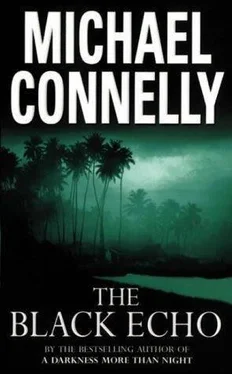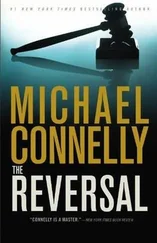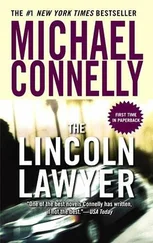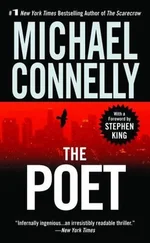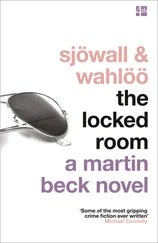“Keep with him,” he said. “When he stops somewhere, I’ll drop a quarter and see what Irving wants to do. When he buzzed me this morning about the kid, he seemed pretty stoked. Like things were getting good. So I don’t want to pull off without his say-so.”
“Whatever. Anyway, how’d Irving know about the kid getting snuffed so fast?”
“I don’t know. Watch it here. He’s taking the 10.”
They followed the gray Caprice onto the Santa Monica Freeway. They were now going away from the working city, against the grain, and were in lighter traffic. But Bosch no longer was speeding. And he went past the Clover Field and Lincoln exits to Eleanor Wish’s home, staying on the freeway until it curved through the tunnel and came out below the beach cliffs as the Pacific Coast Highway. He headed north along the coast, with the sun bright overhead and the Malibu mountains just opaque whispers ahead in the haze.
“Now what?” Clarke said.
“I don’t know. Hang back some.”
There wasn’t much traffic on the PCH and they were having trouble keeping at least one car between them and Bosch’s car at all times. Though Lewis still believed that most cops never bothered to check if they were being followed, today he was making an exception to that theory with Bosch. His witness had been murdered; he might instinctively think someone had been following him, or still was.
“Yeah, just hang back. We got all day and so does he.”
Bosch’s pace held steady for the next four miles, until he turned into a parking lot next to Alice’s and the Malibu pier. Lewis and Clarke cruised by. After a half mile Clarke made an illegal U-turn and headed back. When they pulled into the parking lot, Bosch’s car was still there but they didn’t see him.
“The restaurant again?” Clarke said. “He must love the place.”
“It’s not even open this early.”
They both began looking around in all directions. There were four other cars at the end of the lot, and the racks on top of them said they belonged to the cluster of surfers rising and falling on the seas south of the pier. Finally, Lewis saw Bosch and pointed. He was halfway to the end of the pier, walking, with his head down and his hair blowing a hundred different ways. Lewis looked around for the camera and realized it was still in the trunk. He took a pair of binoculars out of the glove compartment and trained them on Bosch’s diminishing figure. He watched until Bosch reached the end of the wooden planking and leaned his elbows on the railing.
“What’s he doing?” Clarke asked. “Let me see.”
“You’re driving. I’m watching. He’s not doing anything anyway. Just leaning there.”
“He’s got to be doing something.”
“He’s thinking. Okay?… There. He’s lighting a cigarette. Happy? He’s doing something… Wait a minute.”
“What?”
“Shit. We should’ve had the camera ready.”
“What’s this ‘we’ shit? That’s your job today. I’m driving. What’s he doing?”
“He dropped something. Into the water.”
Through the field glasses Lewis saw Bosch’s body leaning limply on the railing. He was looking down into the water below. There was no one else on the pier as far as Lewis could see.
“What did he drop? Can you see?”
“How the fuck do I know what he dropped? I can’t see the surface from here. Do you want for me to go out there and get one of the surfer boys to paddle over and see for us? I don’t know what he dropped.”
“Cool your jets. I was just asking. Now, can you remember the color of this object he dropped?”
“It looked white, like a ball. But it sort of floated.”
“I thought you said you couldn’t see the surface.”
“I meant it floated down. I think it was a tissue or some kind of paper.”
“What’s he doing now?”
“Just standing there at the railing. He’s looking down into the water.”
“Crisis of conscience time. Maybe he’ll jump and we can forget this whole damned thing.”
Clarke giggled at his feeble joke. Lewis didn’t.
“Yeah, right. I’m sure that’s going to happen.”
“Give me the glasses and go call in. See what Irving wants to do.”
Lewis handed over the binoculars and got out. First, he went to the trunk, opened it and got out the Nikon. He attached a long lens and then took it around to the driver’s window and handed it to Clarke.
“Get a picture of him out there, so we’ll have something to show Irving.”
Then Lewis trotted over to the restaurant to find a phone. He was back in less than three minutes. Bosch was still leaning on the rail at the end of the pier.
“Chief says under no circumstances are we to break off the tail,” Lewis said. “He also said our reports sucked ass. He wants more detail, and more pictures. Did you get him?”
Clarke was too busy watching through the camera to answer. Lewis picked up the binoculars and looked. Bosch remained unmoving. Lewis couldn’t figure it. What is he doing? Thinking? Why come all the way out here to think?
“Fucking Irving, that figures,” Clarke suddenly said, dropping the camera into his lap to look at his partner. “And yeah, I got a few pictures of him. Enough to make Irving happy. But he’s not doing anything. Just leaning there.”
“Not anymore,” Lewis said, still looking through the binoculars. “Start her up. It’s showtime.”
***
Bosch walked off the pier after dropping the crumpled hypnotism memo into the water. Like a flower cast on a spoiled sea, it held its own on the surface for a few brief moments and then sank out of sight. His resolve to find Meadows’s killer was now stronger: now he sought justice for Sharkey as well. As he made his way on the old planking of the pier he saw the Plymouth that had been following him pull out of the restaurant lot. It’s them, he thought. But no matter. He didn’t care what they had seen, or thought they had seen. There were new rules now, and Bosch had plans for Lewis and Clarke.
He drove east on the 10 into downtown. He never bothered to check his mirror for the black car because he knew it would be there. He wanted it to be there.
When he got to Los Angeles Street, he parked in a no-parking zone in front of the U.S. Administration Building. On the third floor Bosch walked through one of the crowded waiting rooms of the Immigration and Naturalization Service. The place smelled like a jail-sweat, fear and desperation. A bored woman was sitting behind a sliding glass window working on the Times crossword. The window was closed. On the sill was a plastic paper-ticket dispenser like they use at a meat-market counter. After a few moments she looked up at Bosch. He was holding his badge up.
“Do you know a six-letter word for a man of constant sorrow and loneliness?” she asked after sliding the window open and then checking her nail for damage.
“Bosch.”
“What?”
“Detective Harry Bosch. Buzz me in. I want to see Hector V.”
“Have to check first,” she said in a pouty way. She whispered something into the phone, then reached to Bosch’s badge case and put her finger on the name on the ID card. Then she hung up.
“He says go on back.” She buzzed the lock on the door next to the window. “He says you know the way.”
Bosch shook Hector Villabona’s hand in a cramped squad room much smaller than Bosch’s own.
“I need a favor. I need some computer time.”
“Let’s do it.”
That’s what Bosch liked about Hector V. He never asked what or why before deciding. He was a let’s-do-it type of guy. He didn’t play bullshit games that Bosch had come to believe everybody in his profession played. Hector rolled his chair over to an IBM on a desk against the wall and entered his password. “You want to run names, right? How many?”
Читать дальше
